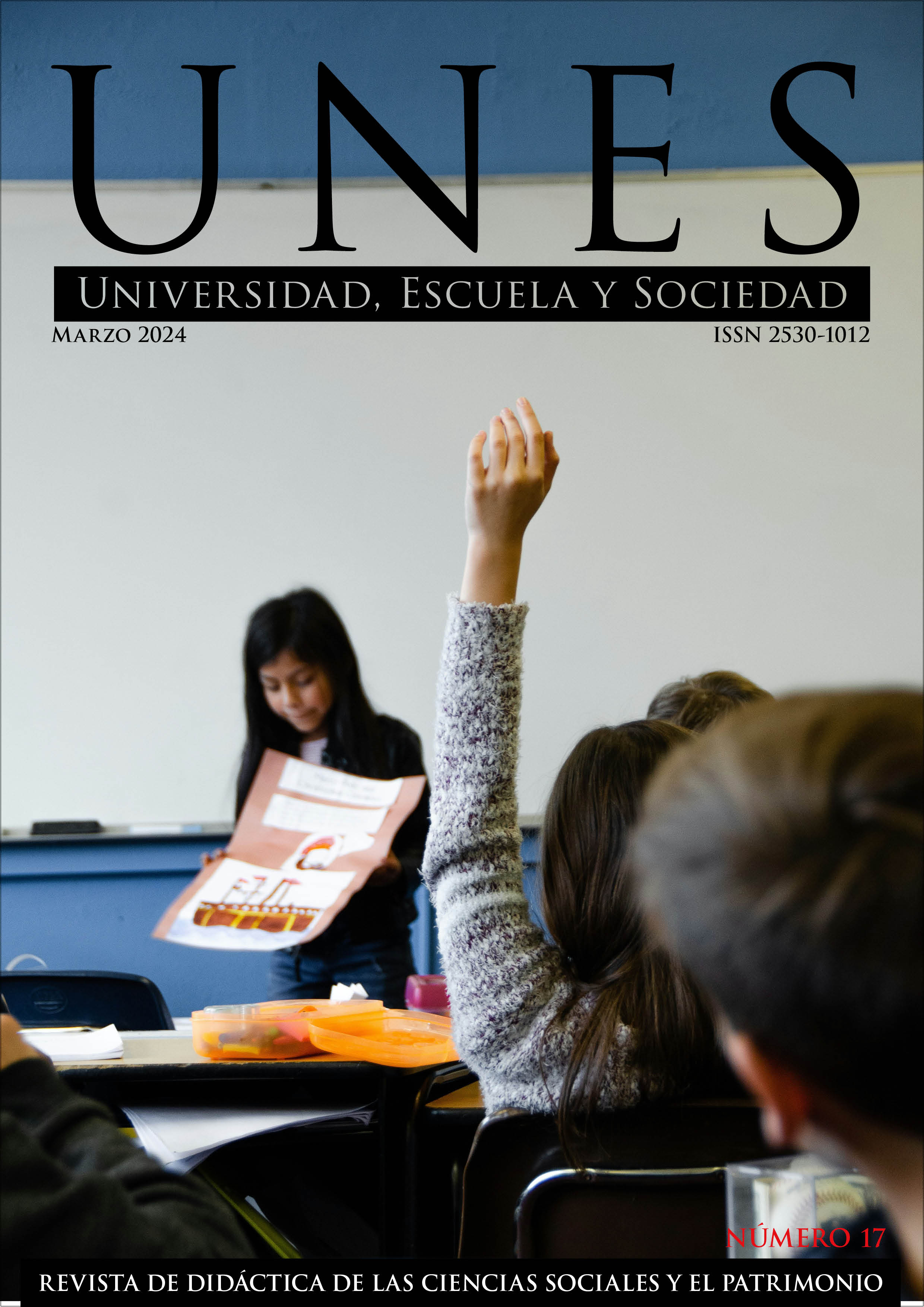Practices on the SDGs for an education for global citizenship
DOI:
https://doi.org/10.30827/unes.i17.27201Keywords:
SDGs, Global Citizenship Education, Educational InnovationAbstract
Introduction: This article introduces a part of the internship program of the Didactics of Social Sciences subject of the Faculty of Educational Sciences of the University of Granada (academic year 2021-2022). The internship program has been designed to train students around the Sustainable Development Goals and it is planned to incorporate the treatment of education for global citizenship.
Method: The research method has been that of participatory-action-research. This methodology has been implemented through different techniques for the development of practices: learning based on projects or problems, service-learning, learning based on challenges and especially cooperative learning.
Results: There has been an increase in the knowledge of the students about the Sustainable Development Goals. A high level of motivation has been verified in the realization of the practices. Carrying out concrete actions and community service has been shown to be an experience highly valued by the students.
Conclusions: The materials for the development of the internship program have been properly designed according to their finality. Students have shown a high degree of satisfaction and the resulting teaching materials are easy to apply and replicate in similar educative contexts.
Downloads
References
Coll, C., Colomina, R. (1990). Interacción entre alumnos y aprendizaje escolar. En C. Coll, J. Palacios y A. Marchesi. Desarrollo psicológico y educación, II Psicología de la Educación. Alianza Editorial. Madrid.
CRUE (2020). Por un Espacio Europeo de Educación Superior más inclusivo, innovador e interconectado. https://www.crue.org/wp-content/uploads/2020/11/2020.11.19-Declaracion-Crue_Bolonia-y-EEES-1.pdf
Dieste, B., Coma, T., Blasco-Serrano, A.C. (2019). Inclusión de los Objetivos de Desarrollo Sostenible en el Currículum de Educación Primaria y Secundaria en Escuelas Rurales de Zaragoza. Revista Internacional de Educación para la Justicia Social, 8(1), 97-115. https://doi.org/10.15366/riejs2019.8.1.006
García Ruiz, C.R., Arroyo Doreste, A., Andreu Mediero, B. (Eds.) (2016). Deconstruir la alteridad desde la Didáctica de las Ciencias Sociales: educar para una ciudadanía global. Entimema. Madrid.
Guevara Albán, G.P., Verdesoto Arguello, A.E., Castro Molina, N.E. (2020). Metodologías de investigación educativa (descriptivas, experimentales, participativas, y de investigación-acción). Revista científica mundo de la investigación y el conocimiento, 4-3, 163-173.
Havelock, R.G., Huberman, A.M. (1980). Innovación y Problemas de la Educación. UNESCO. París.
Imbernón, F. (1996). En busca del discurso educativo. Editorial Magisterio del Río de la Plata. Buenos Aires.
Limón-Domínguez, D. (Dir.) (2019). Ecociudadanía: Retos de la educación ambiental ante los objetivos de desarrollo sostenible. Octaedro.
Melero-Aguilar, N., Torres-Gordillo, J., García–Jiménez, J. (2020). Retos del profesorado universitario en el proceso de enseñanza-aprendizaje: aportaciones del método ECO (explorar, crear y ofrecer). Formación Universitaria, 13-3, 157-168.
Murga-Menoyo, M.Á. (2018). La Formación de la Ciudadanía en el Marco de la Agenda 2030 y la Justicia Ambiental. Revista Internacional de Educación parala Justicia Social, 7(1), 37-52. https://doi.org/10.15366/riejs2018.7.1.002
UNESCO (2013). Documento final de la consulta técnica sobre educación para la ciudadanía mundial. https://unesdoc.unesco.org/ark:/48223/pf0000224115_spa
Downloads
Published
How to Cite
Issue
Section
License
Copyright (c) 2024 Daniel Jesús Martín-Arroyo Sánchez, Vicente Marcial Ballesteros Alarcón

This work is licensed under a Creative Commons Attribution-NonCommercial-ShareAlike 4.0 International License.
Authors being published in this journal agree to the following terms:
The authors retain their copyrights but guarantee the journal's right to be the first publisher of the work, licensed under a Creative Commons Attribution-NonCommercial-ShareAlike 4.0 International license, which allows others to share the work, provided that they acknowledge its authorship and initial publication in this journal.
Authors may separately subscribe additional agreements for the non-exclusive distribution of the work published in the journal (for example, including it in an institutional repository or publishing it in a book), with recognition of its initial publication in this journal.
Authors are allowed and encouraged to disseminate their work electronically (for example, in institutional repositories or on their own websites) before and during the submission process, as this may result in productive exchanges, as well as more and earlier citations of the works to be published (See The Effect of Open Access) (in English).






 ISSN-e: 2530-1012
ISSN-e: 2530-1012









